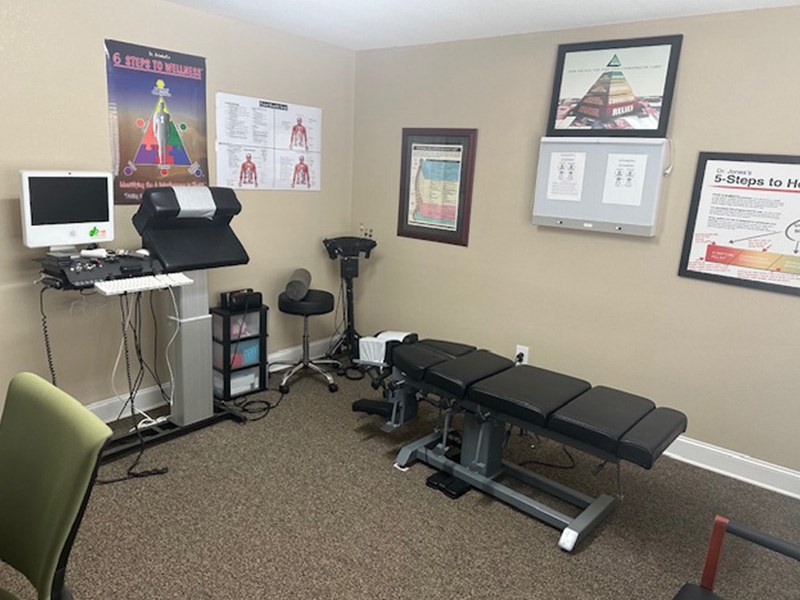We're excited to announce that Total Health Chiropractic of Soddy Daisy is now Alpha Chiropractic!
We are committed to providing the same exceptional care under our new name.
Your Soddy-Daisy destination for chiropractic care.
Chiropractic is a natural health care profession in which doctors use their hands to gently adjust the spine to take pressure off of compressed nerves and increase the flexibility of the spine. Daily stresses and injuries can cause a misalignment of your spine. These misalignments can cause nerve interference as well as a loss of motion in the spine. Chiropractors are trained to detect and remove these misalignments to allow your body to function optimally.
Services We Provide.
Offering the gold standard in chiropractic wellness care and therapies.
At Alpha Chiropractic, take the time to listen to you and find out what type of pain and discomfort you have in order to help your body function at its best. Exceptional patient care is our commitment to you. We promise an honest assessment of your condition. First we assess your pain and figure out its cause as well as take into account your lifestyle, work environment, and physical/chemical/emotional stress levels.
Then, after we gain a better understanding of your specific needs, we devise a treatment plan that will allow you to enjoy a pain-free life.
WE ARE AUTO INJURY EXPERTS
We have extensive experience treating auto accident and work-related injuries so you can feel confident that we know exactly how to get you out of pain, feeling better, and back to living your life.
ConditionS and Injuries we treaT AND correct.
Our experienced team is trained to help relieve your pain and prevent future injuries. We are highly skilled in treating the following:
Back Pain
A non-invasive, natural method to relieve your back pain and alleviate associated symptoms.
Neck Pain
Improve the mobility of the spine and restore range of motion, reduce pain, soreness and stiffness.
Headaches
We evaluate all possible causes of your headache pain and create a treatment plan to suit your needs.
Auto Injury
Collision-induced forces can cause soft-tissue injuries that should be addressed as soon as possible.
Sports INjury
Superior treatments for athletic injuries as well as key injury prevention techniques.
Bladder Leakage
We can help with bladder leakage. Break free from your worries and get your life back.
Dr. Marcus Jones, D.C.
Dr. Marcus Jones graduated Palmer College of Chiropractic, the original and most prestigious Chiropractic University, in 1986 along with his twin brother Dr. Shawn Jones.
A caring, intuitive doctor means A Better overall experience.
Your Preferred Soddy-Daisy Chiropractor
Dr. Marcus opened private practice in Chattanooga TN in June 1987. He built the practice into one of the busiest practices in the state before leaving practice December 1990 to recover from injuries sustained in a head-on collision. After his time rehabilitating, he accepted a position at Palmer College as an Instructor in the Technique Dept. in 1991. Soon after Dr. Marcus was appointed Chairman of the Dept. of Chiropractic Protocol (Business and Ethics). He researched and developed the department to 120 credit hours before leaving Palmer to return to private practice again.
Graduated Palmer College of Chiropractic
Genuine compassion and concern for people and their health
We strive to provide a feeling of well-being and relief from the moment you walk into our peaceful, inviting space until the moment you leave - relaxed and free from pain.
Motor vehicle ACCIDENT pain/injury?
Don’t wait! Visiting a chiropractor after a motor vehicle accident is crucial.
Collision-induced forces can cause soft-tissue injuries that may not even present symptoms until days or weeks after an accident has occurred. Please call, come in, or schedule an appointment as soon as possible.
Offering solutions. Not problems. We accept most major insurance.
We’ve partnered with most major insurance carriers to ensure that your road to wellness is a little less bumpy.
We accept most insurances, but please check our current insurance list to make sure your plan is accepted. If you have any questions, please call our office and our friendly staff can assist you with your coverage.
Accepted Insurances
Aetna
Auto Insurance
BlueCross BlueShield
Cigna
Personal Injury
United Healthcare
And More
A UNIQUE APPROACH To Pain Relief and Wellness.
Our chiropractic and wellness services are the first step towards a pain-free, active lifestyle.
Our care is focused on you - as an individual
We create a personalized plan based on your individual needs. With our gentle and effective treatment options, you can feel confident that you’ll get better…and stay that way.
We go above and beyond adjustments
We are more than a “quick fix” for neck and back pain. We focus on whole body wellness - working with you to help your body function at its highest level.
We support you throughout your journey
The minute you walk in - you become part of our family. We work with you throughout your journey to ensure you are able to achieve your goals and live your life to the fullest.
Our Location and Hours
8301 Dayton Pike, Soddy-Daisy, TN 37379
Office Hours
Our Patients Are our Number one Priority!
Read reviews from our patients






